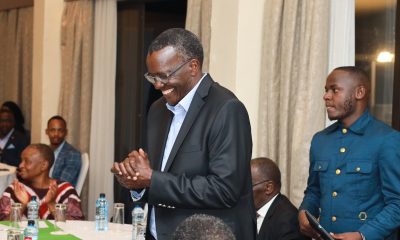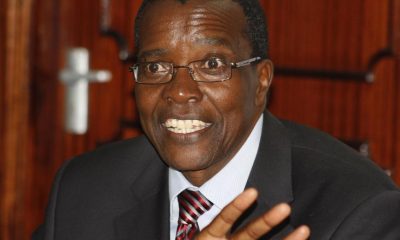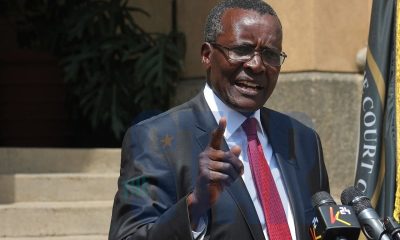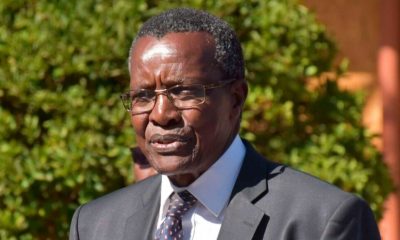Politics
Maraga Discloses Total Amount Raised by Kenyans Through His Online Fundraising Website
Maraga has left the door open to forming alliances with like-minded leaders, suggesting his campaign could become the nucleus of a broader coalition.
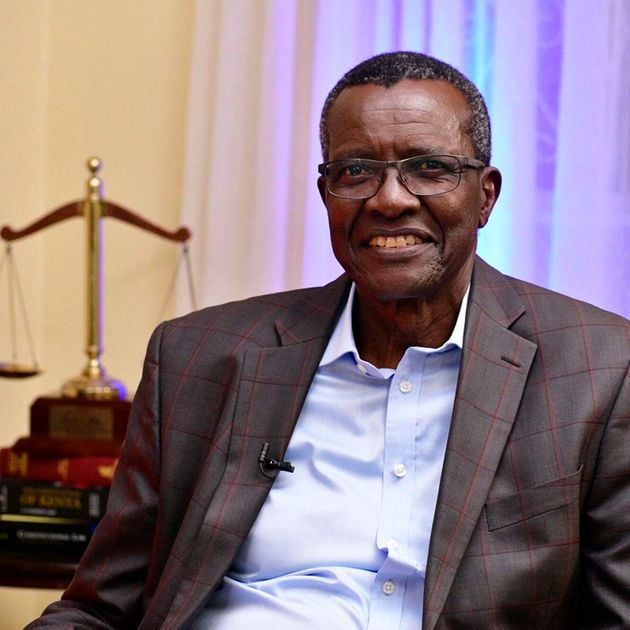
Former Chief Justice David Maraga has disclosed that his nascent 2027 presidential campaign has already mobilized over 500,000 shillings within just two days of launching his contribution website, signaling what could be the beginning of a grassroots-powered political movement in Kenya.
Speaking during an interview on a local television on Monday, the former judicial chief revealed the impressive early response to his unconventional fundraising approach, which he positions as a stark departure from traditional campaign financing methods that he claims rely on stolen public resources.
“We have set up a website, and within two days, Kenyans had contributed more than 500,000 shillings. Those in the diaspora have put in dollars. That tells you that Kenyans want change,” Maraga declared, his voice carrying the conviction that marked his tenure at the helm of Kenya’s judiciary.
The revelation comes at a time when campaign financing has become a contentious issue in Kenyan politics, with many questioning the sources of the vast sums required to mount successful presidential campaigns.
Maraga’s decision to embrace crowdfunding through digital platforms represents a bold experiment in transparent political financing that could reshape how future campaigns are funded.
The former Chief Justice’s early fundraising success appears to validate his belief that Kenyans are hungry for an alternative to what he characterizes as a corrupt political establishment. The fact that diaspora Kenyans are contributing in foreign currency suggests his message is resonating beyond the country’s borders, tapping into a global network of Kenyans seeking change back home.
Maraga’s fundraising disclosure was embedded within a broader critique of Kenya’s current political and economic trajectory.
He painted a grim picture of a nation teetering on the edge of financial collapse, warning that the country’s mounting debt crisis could lead to default if decisive action isn’t taken.
“Public debt has gone haywire since 2013. It has risen to unimaginable levels that unless we take care, Kenya is going to default, and if so, we will see what we have never seen,” he cautioned, his words carrying the weight of someone who has observed the country’s governance challenges from the highest echelons of power.
The former judicial chief didn’t mince words when addressing what he sees as the corrupting influence of money in Kenyan politics. His criticism was particularly sharp when discussing how politicians use public resources to fund their campaigns while ordinary citizens struggle with basic services.
“Money that you are being given is money that has been stolen from you. You are being bribed to vote for them as you continue suffering with no medicines in hospitals, no funding for schools,” Maraga stated, framing his campaign as a moral crusade against systemic corruption.
This messaging strategy appears designed to capitalize on growing public frustration with Kenya’s political class, particularly among younger voters who have borne the brunt of economic challenges.
By positioning himself as the candidate of clean governance and fiscal responsibility, Maraga is attempting to create clear water between himself and established political figures.
The timing of Maraga’s fundraising revelation is particularly significant as Kenya’s political landscape begins to take shape ahead of the 2027 elections. While traditional political heavyweights are likely to rely on established networks and deep-pocketed backers, Maraga’s approach suggests he believes there’s an appetite for a different kind of politics.
His promise to release a comprehensive manifesto in the coming months indicates that this early fundraising phase is just the beginning of a more structured campaign approach.
The document is expected to outline specific policy proposals for economic revival and governance reform, providing voters with concrete alternatives to current approaches.
Perhaps most intriguingly, Maraga has left the door open to forming alliances with like-minded leaders, suggesting his campaign could become the nucleus of a broader coalition.
His criteria for potential partners centers on their commitment to fighting corruption, revamping the economy, and respecting human rights.
The early fundraising success, while modest in absolute terms, represents something potentially more significant than the sum itself.
It suggests that Maraga’s message of clean governance and economic reform is finding an audience willing to put money behind their convictions.
Whether this early enthusiasm can be sustained and scaled up to mount a credible challenge to more established political machinery remains to be seen.
As Kenya approaches what promises to be a pivotal election cycle, Maraga’s digital-first, transparency-focused approach to campaign financing may well set new standards for political fundraising in the country.
His ability to convert online support into actual votes will ultimately determine whether his experiment in grassroots politics can translate into electoral success.
The former Chief Justice’s campaign represents more than just another presidential bid; it’s positioning itself as a test of whether Kenyan voters are ready to embrace a fundamentally different approach to politics, one built on small donations rather than big money, and on transparency rather than backroom deals.
Kenya Insights allows guest blogging, if you want to be published on Kenya’s most authoritative and accurate blog, have an expose, news TIPS, story angles, human interest stories, drop us an email on [email protected] or via Telegram
-

 Grapevine1 week ago
Grapevine1 week agoAlleged Male Lover Claims His Life Is in Danger, Leaks Screenshots and Private Videos Linking SportPesa CEO Ronald Karauri
-

 Lifestyle2 weeks ago
Lifestyle2 weeks agoThe General’s Fall: From Barracks To Bankruptcy As Illness Ravages Karangi’s Memory And Empire
-

 Grapevine4 days ago
Grapevine4 days agoRussian Man’s Secret Sex Recordings Ignite Fury as Questions Mount Over Consent and Easy Pick-Ups in Nairobi
-

 Investigations2 weeks ago
Investigations2 weeks agoEpstein Files: Sultan bin Sulayem Bragged on His Closeness to President Uhuru Then His Firm DP World Controversially Won Port Construction in Kenya, Tanzania
-

 Business2 weeks ago
Business2 weeks agoKRA Can Now Tax Unexplained Bank Deposits
-

 Investigations1 week ago
Investigations1 week agoEpstein’s Girlfriend Ghislaine Maxwell Frequently Visited Kenya As Files Reveal Local Secret Links With The Underage Sex Trafficking Ring
-

 News1 week ago
News1 week agoState Agency Exposes Five Top Names Linked To Poor Building Approvals In Nairobi, Recommends Dismissal After City Hall Probe
-

 Investigations21 hours ago
Investigations21 hours agoMulti-Million Dollar Fraud: Three Kenyans Face US Extradition in Massive Cybercrime Conspiracy

